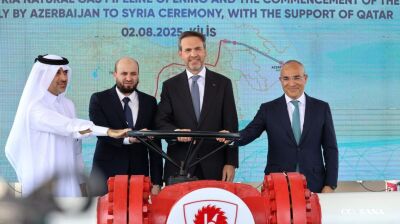The Azerbaijani parliament is moving forward with legislation that would legalise casino operations on artificial land areas in the Caspian Sea, with proposed state fees of AZN340,000 (approximately $200,000) annually. The development appears closely aligned with the business interests of Emin Agalarov, the former son-in-law of President Ilham Aliyev.
The proposed legislation, outlined in articles 22.0.42 and 23.2-1 of the state fee law, represents a dramatic shift from Azerbaijan's longstanding prohibition on gambling, which has been in place since 1998 when then-President Heydar Aliyev banned casinos, citing their negative impact on society and the economy.
According to draft amendments to the Law on State Fees reviewed by parliament on June 18, operators seeking to establish casino games on artificial land areas within Azerbaijan's portion of the Caspian Sea would face substantial licensing costs: an initial AZN340,000 plus an additional AZN340,000 annually for the duration of the licence.
The timing of this legislative push appears closely coordinated with the ambitious casino plans of Agalarov, a prominent Azerbaijani businessman and People's Artist who was previously married to Aliyev's daughter. In October 2024, Agalarov publicly expressed his desire to open a casino at his luxury Sea Breeze resort complex in the conservative Nardarani settlement on the Absheron Peninsula. "Sea Breeze would benefit significantly if we could integrate the gambling business. This is being considered by the state," Agalarov told Russian journalist Ksenia Sobchak in an interview that sparked widespread discussion. "Everyone understands that casinos are a tourist attraction. If this plan can be implemented, the project will be completely finished," he said.
Media campaign
Agalarov's confidence in his casino proposal appears rooted in recent precedent and lessons learned from previous failures. While Ibrahim Nehramli's Khazar Islands casino proposal collapsed along with his artificial island development due to financial difficulties, the 2015 oil price crash and lack of political support, Agalarov has successfully lobbied for legislative changes to support his Caspian Dream Liner project, an artificial peninsula in the Caspian Sea featuring luxury residential buildings designed to resemble a cruise ship.
The contrast between Nehramli's failed attempt and Agalarov's apparent success highlights the importance of political connections in Azerbaijan's business environment. According to RFE/RL’s Azerbaijani service, the law on creating artificial lands in Azerbaijan was specifically designed to facilitate Agalarov's plans for selling elite housing, demonstrating how legislation can be tailored to accommodate the business interests of the president's family members. Parliament passed special legislation allowing this project to proceed, even though construction had reportedly begun before the law was officially adopted.
Parliamentary supporters of the casino legislation have emphasised the economic benefits, pointing to substantial revenue generated by gambling industries in neighbouring countries. MP Vugar Bayramov, a member of the Economic Policy, Industry and Entrepreneurship Committee, highlighted that the global casino industry generates over half a trillion dollars annually, with projections suggesting continued growth to $745bn by 2028.
"Many tourism countries allow casino operations, and this could be one such step for Azerbaijan," Bayramov told Report news agency. "Although Georgia is smaller than Azerbaijan in territory and population, it leads in tourism revenues. A significant portion of Georgian casino revenues comes from foreign clients, including tourists from Azerbaijan," he added.
However, Bayramov's current enthusiasm for casino legalisation represents a stunning reversal from his position just nine years ago. In March 2016, when he was an independent economist, Bayramov was among the harshest critics of casino proposals, specifically condemning Nehramli's artificial island casino plan. "I am sure that not only in any Muslim country, but even in Christian states, a person with Hajji status [someone who made pilgrimage to Mecca] would not desire the operation of casinos, i.e., gambling houses, in his country," Bayramov said in 2016, directly attacking Nehramli's proposal.
More significantly, Bayramov made sophisticated arguments about the risks of casino legalisation that directly contradict his current position. "Casino operations will be accompanied more by money laundering than tourism development," he argued in 2016. "Especially those who earn money through illegal means can show that they won it in a casino when legalising those funds." He also dismissed the economic logic that he now champions: "It is not reasonable to expect that foreign tourists interested in such games would come to expensive Azerbaijan rather than visa-free Georgia for casino games," he said.
Bayramov's complete ideological transformation illustrates how Azerbaijan's political system rewards loyalty over consistency. His evolution from casino critic to parliamentary champion demonstrates the practical reality for those seeking political advancement: criticism of policies favoured by the ruling elite must be abandoned in favour of support, regardless of previous principled positions. Even when their family members — Gubad Ibadoglu, in the case of Bayramov — are being persecuted. Ibadoglu, an academic and advocate for democratic reforms, is under house arrest that is widely considered to be politically motivated.
The argument reflects a growing concern among Azerbaijani officials about capital flight to regional gambling destinations. According to them, economic data suggests that Azerbaijani citizens spend millions annually in casinos in Georgia, Russia, and other countries where gambling is legal, representing lost revenue and tourism potential for the domestic market. They claim that Georgian casinos, particularly in the Black Sea city of Batumi, have become increasingly popular destinations for wealthy Azerbaijanis seeking entertainment options unavailable at home. In 2024, Georgia's casino sector generated approximately $330mn, about 8% of the country's $4.1bn tourism revenue. However, supporters of this claim don't put forward any reliable data except for anecdotal evidence.
Since April 2025, Azerbaijani media outlets have conducted an intensive campaign highlighting the benefits of legalising gambling, according to media monitors like Mikroskop Media, Jam News and Meydan TV. Television channels and online publications have featured numerous reports on successful casino industries in other countries, often emphasising the economic benefits and job creation potential. This media blitz mirrors previous campaigns that preceded major business launches connected to the presidential family. According to Jam News, a similar pattern emerged in 2023 when Pasha Holding, controlled by the Aliyev family, prepared to enter the taxi business. Television channels suddenly began criticising existing taxi services, highlighting their shortcomings before Pasha Holding's new taxi service entered the market.
Agalarov has been actively promoting his casino project on social media, posting videos and updates that sometimes feature Economy Minister Mikayil Jabbarov. The businessman has positioned his Sea Breeze resort as Azerbaijan's potential answer to Las Vegas, arguing that the conservative Nardaran settlement could become the "Absheron Las Vegas" with his interview with Sobchak.
Previous attempts
The current legislative push represents the culmination of several previous attempts to reintroduce gambling to Azerbaijan, with businessman Nehramli last making an attempt nearly a decade ago. When faced with fierce criticism over his 2016 casino proposal, Nehramli mounted an unusual defence that revealed his unfamiliarity with public relations management. Rather than focusing on economic arguments, Nehramli attempted to reframe casinos as cultural institutions rather than gambling venues. "People criticising my ideas don't know what a casino actually is," Nehramli declared in response to the backlash. "They've never been to a casino themselves. That's why when they hear ‘casino', they think of gambling. Casino is not actually gambling — it's a culture," he claimed.
The businessman recounted his first casino visit in 1997, when a foreign colleague invited him to a casino-club. "I said, what business do I have in a casino? I looked at it very badly. He said, come, but you won't play. But when I was there, I saw that the casino is not actually gambling. This is also a culture," he argued. Nehramli's defence became increasingly desperate as he tried to distance himself from gambling whilst simultaneously promoting casinos. "As a Hajji, I consider gambling forbidden for myself. I have never gambled and am not interested in it at all," he insisted, before adding contradictorily: "But I went to casinos several times to observe what this place actually is."
Perhaps most tellingly, Nehramli revealed that his casino proposal was driven by foreign investor demands rather than his own vision. "A foreign investor says he will bring Chinese people here to buy houses. The condition is that if there's no casino, it will be difficult to attract tourists here," he explained, suggesting that the casino was seen as essential for the viability of his struggling Khazar Islands project. His defensive tone culminated in accusations against his critics: "It seems some people are very idle and can't find topics to discuss. Those who are afraid to mention officials' names and criticise them are coming after me instead." "Time will prove me right about the casino," he concluded. Perhaps he was right.
The country's complex relationship with casinos dates back to the early 1990s when the first casino, Admiral Eka, opened in the Absheron Hotel (now JW Marriott Absheron) in central Baku on January 10, 1991.
By the late 1990s, Baku hosted approximately ten legal casinos and numerous underground gambling establishments. However, the industry became embroiled in scandal when Turkish businessman Ömer Lütfi Topal, known as Turkey's "gambling king”, became involved in casino operations through his company Emperyal Tourism A.Ş. Controversial reports suggested that Ilham Aliyev, then the son of Azerbaijan’s previous president Heydar Aliyev, had business dealings with Topal and allegedly owed the Turkish businessman $500,000 in gambling debts. Although these claims were later disputed by Ilham Aliyev, who accused Rasul Guliyev, one of the exiled opposition leaders, of spreading illicit rumours about him, the scandal contributed to Heydar Aliyev's decision to ban all gambling operations in 1998.
The presidential decree stated that casinos and gambling establishments were "rooting new types of crimes in society" and promoting activities "contrary to our national morality”. The ban specifically criticised the Europe Hotel casino, operated under Topal's management, calling for investigations into its construction and operations.
Implementation challenges and scepticism
The proposed legislation would require significant amendments to multiple laws, including the criminal code and administrative offence regulations. The draft Law on Licenses and Permits would expand the list of activities requiring licenses due to state security considerations, specifically including casino operations on artificial land areas in the Caspian Sea. Legal experts note that Azerbaijan's current regulatory framework lacks comprehensive gambling legislation. Human rights lawyer Khalid Bagirov has pointed out that while casino operations are restricted, various forms of gambling already exist in the country through state-sanctioned lotteries and sports betting operations.
"Topaz, Misli, Poz-Qazan — all of these are forms of gambling. Any games for interest, to win, are considered gambling and regulated by law," Bagirov explained to Meydan TV. "There is legislation regulating these games, and there's an entire chapter in the Civil Code about organising games,” he said
The current regulatory environment allows the Turkish company Demirören Holding to operate Azerbaijan's lottery and sports betting systems under a 10-year management contract signed in 2021. This arrangement suggests that the government is willing to work with international partners in the gambling sector, potentially paving the way for casino operations.
Supporters of casino legalisation argue that the industry could generate substantial revenue for the state budget and create thousands of jobs. Tourism expert Jeyhun Ashurov noted that casino tourism represents a specific market segment that could attract high-spending visitors to Azerbaijan. However, economist Rovshan Aghayev expressed scepticism about the potential benefits, arguing that Azerbaijan lacks the tourism infrastructure and appeal to compete effectively with established regional casino destinations.
"Azerbaijan is not really a tourist country, no matter how much the government promotes it," Aghayev said to Meydan TV. "A tourist country would never keep its land borders closed for so long. In the region, there are countries like Georgia that have created conditions for casino operations. Kazakhstan has also created such conditions in some regions," he argued. Aghayev also raised concerns about transparency and taxation, noting that if casino companies operate under government patronage, there may be insufficient oversight of their activities and revenues.
Besides economics, proposed casino legislation also faces potential opposition from conservative religious groups and social organisations concerned about gambling's impact on society. Azerbaijan's Muslim population, while generally secular in outlook, includes significant conservative elements that view gambling as contrary to Islamic principles. Critics also worry about gambling addiction, family financial destruction, money laundering, and other social problems associated with casino operations. These concerns mirror the arguments used by Heydar Aliyev in 1998 when he banned gambling operations.
However, supporters argue that proper regulation and oversight can minimise these risks while capturing economic benefits currently flowing to neighbouring countries. They point to successful models in other Muslim-majority countries where casinos operate under strict regulatory frameworks. One of such supporters is Agalarov himself.
According to him, the casino legislation represents part of Azerbaijan's broader strategy to diversify its economy away from oil dependence and develop its non-oil sectors. The country has been investing heavily in tourism infrastructure, including the construction of a new motorway connecting Baku International Airport to the Sea Breeze resort, reducing travel time to just 20 minutes. This infrastructure development appears designed to support Agalarov's vision of creating a major entertainment destination that could compete with regional rivals. The businessman has argued that casino operations are compatible with Muslim-majority countries, citing examples from Gulf states where gambling is integrated into the hospitality sector. "The example of Arab monarchies shows that a well-regulated casino industry can coexist with local traditions and provide significant growth in tourism revenue," Agalarov stated in his interview with Sobchak.
Political calculations
As parliament prepares to vote on the casino legislation, the outcome will likely depend on political calculations involving the Aliyev family's business interests, economic development priorities, and social concerns. Which means the law will certainly pass. The substantial state fees proposed in the legislation suggest that authorities view casino operations as a significant revenue source while maintaining barriers to entry that could limit competition. After all, Agalarov is the only person wealthy enough in the country to use such a law to his benefit.
If — or rather when — approved, the legislation would mark a historic reversal of Azerbaijan's 27-year ban on casino operations and could reshape the country's entertainment and tourism landscape. However, success will depend on effective implementation, proper regulation, and the ability to attract both domestic and international visitors to what Agalarov envisions as the "Absheron Las Vegas”.
Features

Is AI making us less intelligent? The debate over declining cognitive skills in the age of ChatGPT and smartphones
Anecdotal evidence from educators paints a troubling picture. Teenagers across the world struggle to properly complete tasks in school, particularly those involving writing.

BEYOND THE BOSPORUS: Arm of state bags itself a crypto exchange
Following claims of money laundering, Icrypex becomes the latest of hundreds of companies to be seized by Turkish regime’s TMSF.

Kazakhstan reviews its big oil contracts looking for a better deal
COMMENT: Kazakhstan is reviewing its big oil contracts Kazakhstan has begun laying the groundwork for a revision of the contracts it signed with big oil in the 1990s when the country was flat on its back.

Can India dump Russian oil imports completely if Trump’s secondary sanctions appear?
Since early 2024 India has typically bought 1.5–2.0 mbpd of Russian crude, or about 35–40% of its total imports. US President Donald Trump is threatening crushing 100% tariffs on Russia’s business partners if they continue to import crude.




